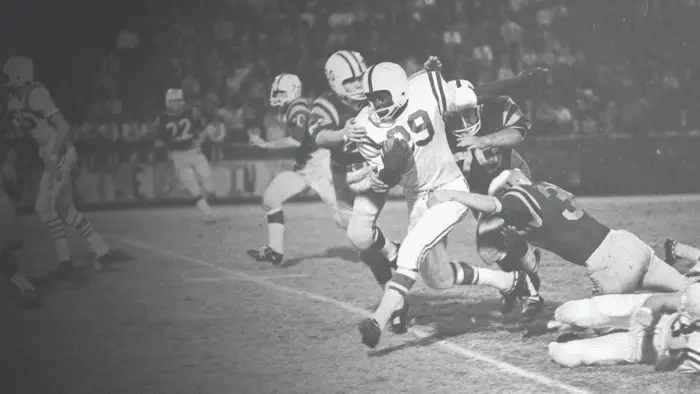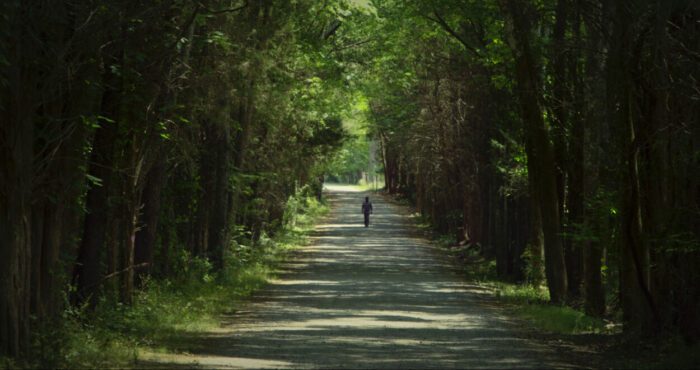For his senior year of high school, all-State running back Jimmie transferred to the nearly all-white Myers Park High School, where he became the school’s first Black football star and later the reluctant subject of a civil rights case. Jimmie’s presence there was an inspiration to many, including a fellow student there named De, a bright young white boy who wrote about the case in his college essay application. From there their paths diverged for five decades, but fate brought the two men—who shared a last name, Kirkpatrick—to discover and embrace A Binding Truth. This new documentary of that name, directed by Louise Woehrle, had the audience at the 2023 Twin Cities Film Festival in tearful, grateful applause.
It was a reception well earned for Woehrle and her team, as A Binding Truth elegantly traces the complex backstory of two men, once high school classmates, now close friends and more. A Binding Truth not only digs deep into Jimmie and De’s family history but into their post high-school lives and their current work together sharing that story. That scope alone places a premium on storytelling economy, which is a virtue of Woehrle’s film. It’s also necessary for viewers to understand and appreciate the full depth of the story’s meaning, for it’s one of slavery’s long legacy and America’s tortured racial division. The “binding truth” between Jimmie and De is one that provides an emotionally resonant, intellectually satisfying way forward for a country still today in deep need of healing and resolution.
Jimmie Lee Kirkpatrick was, in his heyday, a known quantity. A Binding Truth begins with his storied football exploits, archival stories and footage brought to life with beautiful, highly effective animations and sound design. Jimmie gained All-State honors and a state championship at the all-black Second Ward High School in Grier Town, where graduation rates were dismal and most graduates tracked for vocational education. With the chance to transfer, Jimmie saw a path forward, perhaps to college, perhaps to the pros. It was, potentially, a way out of Grier Town most of its residents could never afford or enjoy, one made possible by his athletic skill and potential.

At his new school, Jimmie made friends with his teammates and led the team in scoring. Despite his accomplishments, he was passed over for selection to the Shrine Bowl, a celebrated high school all-star football game between North Carolina and South Carolina. In that respect, Jimmie was not unusual: no black player had been selected in the game’s 28 years. Charlotte attorney Julius Chambers sued to stop the game in protest, and a judge ruled that while the game could be played as scheduled, it would in the future have to integrate. A judge ruled that the Shrine Bowl could be played in December as scheduled, but that it must be integrated going forward. For his efforts, Chambers’ and other civil rights attorneys’ houses were bombed shortly after.
It was an episode that struck a chord with De Kirkpatrick. He and Jimmie had struck up a casual friendship and jokingly called each other “Cuz” in the hallways at Myers. Chafing against his father’s racism, De hoped to be a better man, and he wrote about the injustice of Jimmie’s case in his Harvard application essay. He got in, protested the Vietnam War there, and later became a successful forensic psychologist. Jimmie, meanwhile, played at Purdue before injuries cut short his career, and the two men with the same last name lost track of each other for five decades.
But history would not forget; instead, it drew them together once again, via a phone call from Jimmie to De in 2016. Jimmie was looking into his past, but genealogical research was a challenge for a descendant of an enslaved person, as slave names were not registered in official census documents; they were recorded only by the names of their owners.
In this case, the name was Kirkpatrick.
Jimmy and De’s reconnection was first told in a three-part story by Gary Schwab for The Charlotte Observer in 2017. A Binding Truth explores the story from there on, from Jimmy and De’s reconnection and their shared story of revelation. The two men are almost foils to each other—Jimmy gregarious, emotional, and direct; De reserved, intellectual, and guarded—but from their interactions and shared pursuit of the truth a truly uncommon friendship, something more even than the very deepest of friendship, emerges.
Though their story is as far-ranging and wide-reaching as the tentacles of slavery itself, Woehrle and her team present A Binding Truth with an unwavering focus on what binds these two very different men with very different upbringings. And both men are worthy of the time A Binding Truth invests. Jimmie, the former athlete and performer, is effusive and forgiving, a man with a high emotional intelligence eager to learn his own family’s history. De is the one who is presented with shocking information about his own family’s past and must confront it; to his credit, De is a model for every white man of privilege. Like him, we can all learn and acknowledge the sins of the past without regret or shame, even if it causes discomfort to do so. De’s pursuit of the truth is every bit as relentless as Jimmie’s.

In every respect, A Binding Truth is an excellent documentary, one that deserves a wide audience. Its storytelling, even with a complex narrative, is economical but emotional. Animation effects, including augmented reality, are used to bring together the past and the present, and its use of archival documents to explore the legacy of slavery is efficient and effective. But most important are its two subjects, two adult men willing to come to grips with our nation’s past and advocate for its future.
In an era when conservative legislatures are determined to prohibit classroom discussion of race-related topics, A Binding Truth presents both an intractable problem and a real solution. The way forward, it argues, is to look at, to understand, to confront and to accept the past; only with an understanding of America’s sins can it hope to achieve anything greater in the future. The audience at the 2023 Twin Cities Film Festival surely understood from the two Kirkpatrick men’s story just how such healing might be possible.
A Binding Truth is winner of the Audience Award at the 2023 Twin Cities Film Festival.




I couldn’t agree with J. Paul Johnson more.
Ms. Woehrle’s choice to foreground the story of her protagonists enables them to speak their respective truths, engaging viewers directly, intimately, and with humanity. Two men from vastly different worlds – one Black; the other white – unravel the history behind their shared surname and are forever changed in the process. The result is an uplifting tale of discovery, community, and redemption.